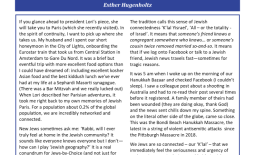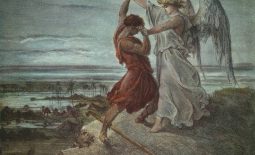Curses and Places
(Please note that this sermon only reflects my understanding and interpretation of the assassination of Charlie Kirk and that this is a developing situation. I encourage the reader to seek out the perspectives of communities who were impacted by Charlie Kirk’s statements for their responses, as well as reliable and credible news sources and other sources of information).
I’ve seen a variety of responses and a flurry of debate regarding the murder of Charlie Kirk on my social media feeds. It goes without saying that my position, as a rabbi, as a human and as someone deeply invested in the project of liberal democracy, is that such political violence is to be roundly condemned, no matter the victim and no matter the perpetrator.
It is also true that Charlie Kirk, the founder of Turning Point USA, was a man with an extreme ideology and odious views. His views on minorities, the African American community, the LGBTQ community and even our Jewish community, deserve to be called out and scrutinized. Mr. Kirk should have been challenged passionately and non-violently in the marketplace of ideas. His assassination pulls at the very threads of American democracy.
While I have no connection – emotional or ideological – to Kirk, my heart aches for his two toddler children who will grow up without a father. To paraphrase James Baldwin: the children are all ours. And all children – from South Sudan to Myanmar to Gaza to Ukraine to the United States to Israel to Venezuela – deserve our care and love. And in this country, that baseline of care and love should include not being shot in schools.
Our attention spans and bandwidth to track, process or comment upon every news item is limited. It has been noted in civil discourse that the assassination of State Speaker Emerita Melissa Hortman and her husband Mark garnered less attention and was marked with less of the pageantry of American civil religion. Only time will tell how momentous the assassination of Charlie Kirk was as a formative historical event. That does not change the fact that every senseless and violent death is a loss of a world; whether that death is acknowledged in the febrile news cycle or not.
It is also important to note that there is a distinction between grieving a person and grieving a reality. Every instance of political murder weakens the fabric of liberal democracy, steers social discourse towards hatred and invites repression. Charlie Kirk did not deserve to die. He did deserve to be held accountable for his words, as every pundit, politician and leader should be – myself included. Kirk’s words will be his legacy and his judgment.
It is unequivocally clear that no political murder should ever be condoned and should in fact be condemned in the strongest of terms. For those of us who opposed many of the ideas and values that Kirk stood for, the moral imperative to condemn the murder of an opponent rather than an ally feels perhaps more pressing and salient. To some of us, it feels like a test of and testimony to our dearest humanitarian values. It is easy for us to reckon with the loss of those who we valued and agreed with. It is much harder to do so for those we see as strident political opponents or even as enemies. And we should regard this situation with the seriousness it calls for: whatever our thoughts about the individual may be, political violence in a culture is often a turning point.
Please allow me to share from my personal experience with political murders from my home country, the Netherlands.
In the early 2000’s, shortly after 9/11, the Netherlands still broadly had a reputation for being liberal, tolerant and progressive. The cracks were already appearing, of course, but much less visible to outsiders. The late 1990’s had seen a wave of austerity policies that undercut Dutch social democracy and increasing rhetoric against immigrants, in particular those of a Muslim background.
In some ways, 9/11 felt like a lit match in a tinderbox. 9/11 was and remains an American tragedy, first and foremost, but in Europe, we were also in shock. I was at my university when I saw the second tower come down on a TV screen. 9/11 supercharged the discourse around Islam and immigration in the Netherlands and I felt the plate tectonics shift beneath my feet. They continue to shift almost 25 years later.
In that context, a far right politician arose. In true, quixotic Dutch style, his presentation was more complex than we might ascribe to US politics. Pim Fortuyn had been a Labor Party intellectual. Now, he was embracing neo-liberalism and hardline anti-immigration rhetoric, steeping himself in the narrative of a ‘clash of civilizations.’ He was also a flamboyant, charismatic and out-and-proud gay man.
I will admit: I detested his politics and I detested – as an Amsterdammer familiar with queer spaces and culture – how he weaponized his homosexuality to punch down to Muslim immigrants. He had a powerful allure and became a hugely popular national figure. It felt as if my multicultural, universalist values were left in the dust.
Then, in 2002, he was assassinated.
I remember the shock and horror I felt. This wasn’t the kind of thing that was supposed to happen in the quiet country of the Netherlands. No politician should be shot in cold blood. I was horrified and aghast, as were most of my countrymen. I knew that only more polarization would come of this.
In my view, the political climate would continue to deteriorate. Fortuyn’s legacy and mantel were taken up by other far-right figures, including Geert Wilders and contrarian filmmaker Theo Van Gogh who made an anti-Islam documentary with Ayaan Hirsi Ali. To this day, Wilders and Hirsi Ali continue to be influential both inside and outside of the Netherlands.
Theo Van Gogh was also someone whose values system clashed with mine. He seemed to relish in provoking Muslims, in his case, weaponizing feminism (while having a track record of being crude and crass with women himself). I noticed his influence as I had noticed Fortuyn’s: the Netherlands became increasingly anti-immigrant; a trend that continues to this day.
Then Van Gogh was assassinated too, a mere two years after Fortuyn was.
Shockwaves traveled through Dutch civil society. I remember sharing the same horror and the same unequivocal condemnation. We felt the plates shift. Nothing would be the same.
The Netherlands is a small and unimportant country but there is no denying that these heinous political murders have altered the culture and body politic of the country. The country continues to spiral deeper into anti-immigrant rhetoric and political instability. These awful political murders brought nothing but horrors to Dutch society and horrors to the vulnerable who were already being singled out and discriminated against. The gentle society I remember from childhood has turned into a hardened culture I no longer recognize nor identity with. I’ve been grieving the Netherlands for a long time now.
Kal v’chomer, all the more so, when political murders happen in a big and important country like the USA. In this week’s Parashah, Ki Tavo, we read of the many curses the Israelites were threatened with if they did not adhere to Divine Law. The curses are diverse, but at the heart of them is the hiddenness and secrecy of each transgression. Whether it is worshipping idols privately or stealthily moving the boundary marker of one’s neighbor or the instances of sexual abuse the Portion litsts among its curses; the unifying element between them is the destruction of societal trust and the violation of the sanctity of both the individual and the covenant that binds us all.
Kirk deserves both a sober-eyed assessment of his legacy and the moral foundation of his inalienable humanity. His murder – like any murder, including Melissa and Mark Hortman’s murder, and the murder of every child in every American school – is a violation of that sacred covenant between us. Secrecy and conspiracy are the enemies of a transparent liberal democracy. We all fear what may fester and it is natural to fear what comes next in terms of polarization and weaponization. Ultimately, it is American society – and in particular the vulnerable among us – who will suffer.
Laws exist to protect us, especially the most vulnerable. Every child is our own, from South Sudan to Myanmar. And yet, none of us alone can bend history to our will. We all must reckon with the inconsistencies and immoralities of selective indignation. The cruelty of forgotten and neglected victims. The vanity of the elevation of the already elevated. This does not mean we should break ranks with our humanity; quite the opposite. The humanity to call to account words of violence and acts of violence, no matter where they come from, for all our sakes. This is the covenant we should keep, for us and for our children.




